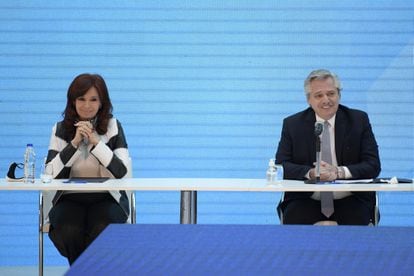Vice President Cristina Fernández with Alberto Fernández at a press conference in August 2020.POOL / Reuters
The vice president of Argentina, Cristina Fernández de Kirchner, continues to corner President Alberto Fernández.
Now he is pressing for the payment of debts to the International Monetary Fund and the Paris Club to be suspended, at least until the pandemic ends.
The power of the former president and current vice president seems to grow day by day, while the popularity of the president is at its lowest point: according to various polls, almost 70% of citizens reject his management.
The economist and deputy Fernanda Vallejos, very close to Cristina Fernández de Kirchner, was the promoter of the so-called Proclamation of May 25 (National Day in Argentina), signed by more than 2,000 politicians, judges, trade unionists, artists, journalists and even some businessman.
Under the title
First health and life, then debt
, the proclamation affirms that Argentina is in a “state of necessity that prevents it from facing the debt commitments contracted, especially with the IMF and other organizations, under the risk of affecting superior interests that the State must protect in a context of pandemic: social vulnerability, health, work, education and housing ”.
More information
The problems of 'Pepín' Simón, the man from the underground of the Argentine justice
Mexico and Argentina begin delivery of AstraZeneca vaccines with a three-month delay
"It is an unsustainable debt," says deputy Vallejos, for whom the suspension of payments should not necessarily mean a
default
if previously agreed with the IMF.
That pact, however, appears highly unlikely, because Kirchnerism wishes to avoid compromises (and possible budgetary sacrifices) before the parliamentary elections in November.
The difficulties highlighted by the proclamation are true: 42% of the urban population lives in poverty and the worst moment of the pandemic is being reached, with the hospital system almost saturated. But Alberto Fernández and his Minister of Economy, Martín Guzmán, promised to continue paying the debt installments until a restructuring was agreed. Just the day after the proclamation was published, the president held a videoconference meeting with German Chancellor Angela Merkel, in which he asked for help in negotiations with the IMF.
A critical moment comes this Monday, the end of May: a debt of 2.4 billion dollars with the Paris Club expires. After expiration, a period of 60 days opens, after which, if Argentina does not pay, it is in
default
. Minister Guzmán tries to achieve an arrangement that will grant him more time (the
default
would mean an automatic interest recharge of close to 2,000 million), but his credibility is reduced by Kirchnerist pressure. That is something that deputy Vallejos denies: "On the contrary, what we do with the proclamation is to support the Government and Minister Guzmán."
Things are interpreted differently at the IMF. Alejandro Werner, head of the institution for the Western Hemisphere, said weeks ago that there were clear divergences in the Argentine government coalition and "uncertainty" about who was managing economic policy. Guzmán's weakness became clear in April, when he wanted to dismiss the undersecretary of Energy, Federico Basualdo, because he was opposed to the sharp increase in energy rates planned by the minister. Kirchnerism disavowed Guzmán and stopped the dismissal. Basualdo, for the moment, is still in his office.
The divergences are obvious. While Kirchnerism demands more social spending and "money in the pocket of Argentines" in the face of the electoral campaign, the Ministry of Economy is carrying out a silent adjustment process. So far this year, social spending rose at an annual rate of less than 30%, compared to inflation of 46%. Analysts consider that at the end of the year the deficit may be well below the 3% foreseen in the budget. However, the word "adjustment" is never spoken. It is a taboo term for Cristina Fernández de Kirchner.
In what is not up to Minister Guzmán, Kirchnerism predominates. Meat exports were suspended for a month, in an anti-inflationary measure that was already tried, without great success, during the presidency of Cristina Fernández de Kirchner. The lawsuit that the previous president, Mauricio Macri, had filed in The Hague for alleged human rights violations in Venezuela was withdrawn. And the UN demanded, along with Venezuela, Cuba and Bolivia, that the actions of Israel and not only that of Hamas be investigated.
The big question now is whether Kirchnerism really intends to repay the debt of 46,000 million dollars with the IMF or if it prefers a few years in
default
, as happened after 2001. Cristina Fernández de Kirchner has repeatedly demanded a “little gesture ”Of the Fund, but it poses almost unaffordable demands: a reduction in interest, currently at 3% per year, something that Washington discards for the moment, and especially the extension of the terms to 20 years, compared to the maximum of 10 established in the IMF rules of procedure. That is putting a lot of tension on the rope.
Alberto Fernández, the moderate who allowed the return of Peronism to power despite the strong rejection generated by his candidacy partner (in reality it was Cristina Fernández de Kirchner who appointed him as a candidate in 2019), tries to strike a balance.
"The truth is, I am not so submissive, and Cristina does not make four screams," he told a radio program this week, insisting that both get along "much better" than is said.
And he repeated, as in the electoral campaign, that they were condemned to understand each other because the division would mean defeat against macrism: "With Cristina it is not enough and without Cristina it is not possible."
Subscribe here to the
EL PAÍS América
newsletter
and receive all the informative keys of the current situation in the region.

